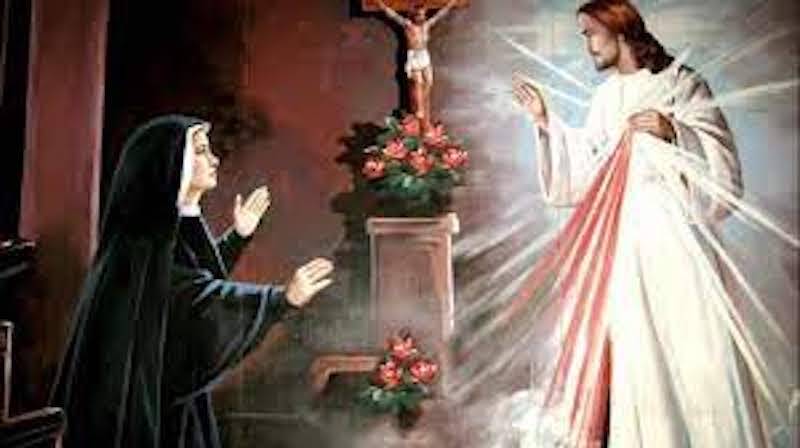
St. Maria Faustina Kowalska is depicted receiving the message from Jesus about the need to establish Divine Mercy Sunday. | catholic.org
Bishop Alfred Schlert, of the Diocese of Allentown, posted a reflection on Divine Mercy Sunday, reminding the faithful of God’s mercy.
“On this Sunday in which we conclude the Octave of Easter, we celebrate Divine Mercy Sunday,” Schlert’s post said. “The mercy of God is something that we can't fully comprehend despite our strongest attempts to understand it.”
It was a fitting tribute, as Divine Mercy Sunday celebrates God's love for us, which has been revealed through Scripture and in the writings of the saints, according to the U.S. Conference of Catholic Bishops (USCCB).
“Our Merciful God loves us so much that He sent His only Son to save us,” Schlert wrote. “He also enters into our lives and shows us, tremendous love, despite our disfiguring sinfulness.”
The celebration dates to the 1930s, when mankind was experiencing an “eclipse of the sense of God.” Jesus appeared to St. Maria Faustina Kowalska, a Polish nun, and emphasized mankind's need for the message of Divine Mercy. He implored her at least 14 times to convince the Church to establish a Feast of Mercy (Divine Mercy Sunday), the USCCB said.
St. Faustina recounted these messages in her diary. One entry reads: ”My daughter, tell the whole world about My inconceivable mercy [...] It is My desire that it be solemnly celebrated on the first Sunday after Easter. Mankind will not have peace until it turns to the Fount of My Mercy."
“The Gospel for this Sunday gives us a glimpse of God's merciful plan for us,” Schlert said in his message. “God breaks into our lives and into our hearts in such a gentle and perfect way like the Lord enters into the locked doors of the upper room. He does not break in like a thief, but He gently enters into our hearts to see if we will accept Him.”
Divine Mercy Sunday offers a renewal of baptismal promises and a cleansing from sin. Jesus told St. Faustina that in preparation for a Feast of Mercy, the faithful should make a complete Confession, and then should receive Holy Communion on the feast day itself, a website about the celebration says.
St. Faustina also created the Divine Mercy Chaplet, according to The Divine Mercy website. The prayer follows the pattern of the Rosary, but on the "Our Father" beads, pray instead: "Eternal Father, I offer you the Body and Blood, Soul and Divinity of Your Dearly Beloved Son, Our Lord, Jesus Christ, in atonement for our sins and those of the whole world." On the "Hail Mary" beads, pray instead: "For the sake of His sorrowful Passion, have mercy on us and on the whole world.”





 Alerts Sign-up
Alerts Sign-up